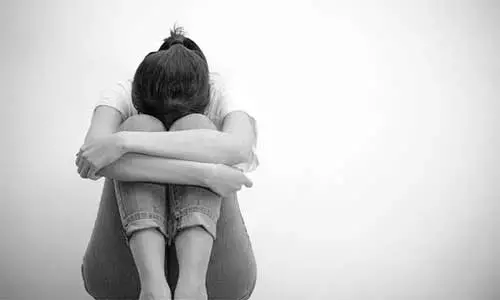- Home
- Medical news & Guidelines
- Anesthesiology
- Cardiology and CTVS
- Critical Care
- Dentistry
- Dermatology
- Diabetes and Endocrinology
- ENT
- Gastroenterology
- Medicine
- Nephrology
- Neurology
- Obstretics-Gynaecology
- Oncology
- Ophthalmology
- Orthopaedics
- Pediatrics-Neonatology
- Psychiatry
- Pulmonology
- Radiology
- Surgery
- Urology
- Laboratory Medicine
- Diet
- Nursing
- Paramedical
- Physiotherapy
- Health news
- Fact Check
- Bone Health Fact Check
- Brain Health Fact Check
- Cancer Related Fact Check
- Child Care Fact Check
- Dental and oral health fact check
- Diabetes and metabolic health fact check
- Diet and Nutrition Fact Check
- Eye and ENT Care Fact Check
- Fitness fact check
- Gut health fact check
- Heart health fact check
- Kidney health fact check
- Medical education fact check
- Men's health fact check
- Respiratory fact check
- Skin and hair care fact check
- Vaccine and Immunization fact check
- Women's health fact check
- AYUSH
- State News
- Andaman and Nicobar Islands
- Andhra Pradesh
- Arunachal Pradesh
- Assam
- Bihar
- Chandigarh
- Chattisgarh
- Dadra and Nagar Haveli
- Daman and Diu
- Delhi
- Goa
- Gujarat
- Haryana
- Himachal Pradesh
- Jammu & Kashmir
- Jharkhand
- Karnataka
- Kerala
- Ladakh
- Lakshadweep
- Madhya Pradesh
- Maharashtra
- Manipur
- Meghalaya
- Mizoram
- Nagaland
- Odisha
- Puducherry
- Punjab
- Rajasthan
- Sikkim
- Tamil Nadu
- Telangana
- Tripura
- Uttar Pradesh
- Uttrakhand
- West Bengal
- Medical Education
- Industry
Tai chi reduces depression, anxiety and improves sleep in stroke survivors: Study

USA: Tai chi, an internal Chinese martial art, may help in reducing anxiety, depression, and stress plus improves sleep in stroke survivors, according to findings from a small feasibility study. Tai chi focuses on releasing tension in the body, incorporating mindfulness and imagery into movement, increasing awareness and efficiency of breathing, and promoting overall relaxation of body and mind.
The findings of the study were presented at the EuroHeartCare - ACNAP Congress 2021, an online scientific congress of the European Society of Cardiology (ESC).
Depression occurs in approximately one-third of stroke survivors and is linked with greater disability and mortality rates. Individuals with post-stroke depression frequently also report anxiety, stress, and poor sleep.
"Mind-body interventions are commonly used among adults to lessen depressive symptoms," said study author Dr. Ruth Taylor-Piliae of the University of Arizona, Tucson, US. "Tai chi practice allows the individual to quiet the mind by dwelling in the present and setting aside unnecessary negative emotions, such as depression."
This study examined the feasibility of using tai chi in people with previous stroke. A total of 11 stroke survivors reporting depression symptoms were enrolled in the study. They were on average 70 years old, and 55% were men.
All stroke survivors attended the tai chi intervention classes, three times each week, for a total of eight weeks. The intervention had been planned for 12 weeks but was shortened due to the COVID-19 pandemic. Each class consisted of a 10-minute warm-up period, 40-minutes of tai chi exercise, and a 10-minute cool-down period. Participants were gradually taught 24 basic movements from the Wu style of tai chi (an average of two new movements per week).
Measurements were taken at the start of the study and repeated after the eight-week intervention. Symptoms of depression, anxiety and stress were assessed using standardised questionnaires. Sleep was assessed during night-time using a triaxial accelerometer, which detects movement. Specifically, the researchers examined sleep efficiency (percentage of time spent sleeping), the amount of time awake after initially being asleep, and the total time awake after going to bed.
After eight weeks of tai chi, the researchers observed significant reductions in symptoms of depression, anxiety and stress compared to baseline, along with better sleep efficiency, less wakefulness after sleep onset, and less time awake.
Dr. Taylor-Piliae said: "At baseline the participants reported mild to moderate symptoms of depression, anxiety and stress. I was surprised and pleased with the improvements we observed in these self-reported symptoms and in sleep with just an eight-week intervention."
The researchers also took blood samples at baseline and eight weeks to measure markers of oxidative stress and inflammation which have previously been associated with post-stroke depression. They found lower activity of the oxidative stress marker after the intervention but no significant changes in any of the inflammatory markers.
Dr. Taylor-Piliae explained: "Our ultimate goal is to see whether tai chi lowers depressive symptoms in stroke survivors and also improves biochemical markers associated with depression."
She concluded: "The results of this feasibility study should be interpreted with caution because of the small sample size and lack of a control group. More research is needed before recommendations can be made about tai chi for people who have had a stroke. We hope to do a randomised trial with a 12-week tai chi intervention in a larger group of patients."
Hina Zahid Joined Medical Dialogue in 2017 with a passion to work as a Reporter. She coordinates with various national and international journals and association and covers all the stories related to Medical guidelines, Medical Journals, rare medical surgeries as well as all the updates in the medical field. Email: editorial@medicaldialogues.in. Contact no. 011-43720751
Dr Kamal Kant Kohli-MBBS, DTCD- a chest specialist with more than 30 years of practice and a flair for writing clinical articles, Dr Kamal Kant Kohli joined Medical Dialogues as a Chief Editor of Medical News. Besides writing articles, as an editor, he proofreads and verifies all the medical content published on Medical Dialogues including those coming from journals, studies,medical conferences,guidelines etc. Email: drkohli@medicaldialogues.in. Contact no. 011-43720751


